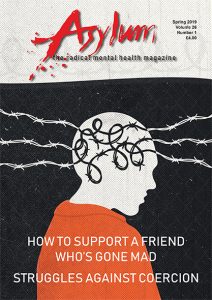Introduction
ASYLUM calls itself the radical mental health magazine. Being radical, or critical, may seem like a relatively straightforward project, but it isn’t always easy to define, or straightforward to put into practice.

There are underlying tensions and disagreements about this: for example, how Mad Liberation can best be achieved; or how to develop more democratic mental health services. Tensions can sometimes be positive, helpful and creative. However, our current political context seems to be exacerbating them in unhelpful and damaging ways. We are living in a society deeply divided post-Trump/Brexit; with a fractured political Left opposition; with continued threats to welfare and support services. All of this contributes to a climate of fear and mistrust. There are plenty of positive examples of unity, support and solidarity, but underlying divisions are often amplified on social media and sometimes accompanied by personal attack and criticism. This cannot be good for our individual or collective mental health.
ASYLUM has always tried to be open to all sections of the radical or critical survivor and mental health community, even though they may sometimes disagree. The main purpose of the magazine is to provide a space where diverse critical perspectives can be heard. Sometimes this feels difficult to achieve with quick-fire responses encouraged by social media. This is one of the reasons why we persist with our printed magazine format, where publication timescales encourage more thoughtful debate and discussion.
If you think we are not covering something important, please write in and let us know. Consider writing something yourself. We understand that sometimes people feel the need to write anonymously, especially in the current context, and we welcome all constructive contributions. We always try and avoid inaccuracies and personal attacks – in any articles we publish. We recognise that we have sometimes failed sufficiently to acknowledge important ontributions. For example, Donnard White, whose article we re-publish in this issue, helped us out over many years in the early days. More recently, we also didn’t give sufficient credit for the hard work of survivor artists, like Nick Lloyd, who helped us considerably with our redesign last year. We take these failings seriously and try to address them, however inadequately. We apologise and try to do better next time.
ASYLUM is a not-for-profit magazine run by a group of unpaid volunteers. Despite our best efforts we still have a very limited circulation. We rely upon the support of our valued readers and supporters. We receive no external sponsorship or funding. PCCS Books kindly print and distribute the magazine for us, but no-one makes any money out of this. We barely break even. We simply, but not easily, try to provide a forum for dignified, honest debate and discussion about mental health issues.
CONTENTS
Editorial – Helen Spandler
The Struggle Against Compulsion – Peter Campbell
In Defense of Villainy – Andy Collings and Emily Sheera Cutler
Lunacy, Liberty and Law – Sabina Dosani
Mad Pride or Prejudice? – Laetitia Levi
Mad Resistance to Pain? – Emily Cutler
Stop the Implementation of the Compulsive Community Treatment in the Greek Mental
Health System
Hidden Gems from Asylum’s Back Catalogue: What to Do if a Friend Goes Mad – Donnard White
Shitfulness – Rin Flumberdank
Survivors History with Frank Bangay
Creative Writing – Caroline Fox, Mark Schwalbe, Ben Gray & Henry Bladon
What’s the Difference Between a Wolf in Sheep’s Clothing and a Snake in the Grass? – Roy Curtis
Life at the Coal Face – Nina Bradshaw
News and Reports
Hygiene Fail – Sara Arenson
Sample articles
What to do if a friend goes Mad – Donnard White
Life at the Coal Face – Nina Bradshaw
Asylum 26(2) electronic
